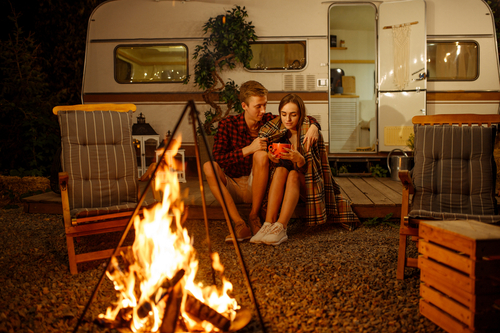Written on: July 6, 2021
 There are so many great things about hitting the road in a recreational vehicle. You can go anywhere while keeping the comforts of home with you. You can enjoy the community of fellow RVers at campsites all over Oklahoma and anywhere in the U.S.
There are so many great things about hitting the road in a recreational vehicle. You can go anywhere while keeping the comforts of home with you. You can enjoy the community of fellow RVers at campsites all over Oklahoma and anywhere in the U.S.
Wherever you go in an RV, don’t forget the propane!
Propane fuels an RV’s heating and air conditioning systems, as well as its appliances, so we always have hot water for showers and cold drinks to quench our thirst.
Don’t feel like cooking in your RV? A propane camp stove or outdoor fryer can still cook up some tasty meals.
A propane heater is a must-have for campers who are sleeping outdoors. Be sure to use one that’s been approved by the manufacturer for camping purposes and contains an automatic shutoff switch in case it tips over or emits carbon monoxide.
Stay itch-free with a propane mosquito trap that mimics human breath and lures mosquitoes to their doom.
Propane is safe to use, thanks in large part to the high industry standards and stringent regulations. It’s important when traveling with an RV that you know how to safely use propane so that you can have a fun, safe trip.
We recommend you receive maintenance to ensure your propane equipment is working at peak performance.
Propane has a rotten egg-like odorant that lets you know if there is a propane leak in or near your RV. If you detect this odor, leave and call 911 immediately.
If you or anyone with you exhibits signs of carbon monoxide poisoning, leave the RV and get help from a medical professional IMMEDIATELY.
Keep a door or vent open while cooking or using another propane appliance in the RV.
NEVER use your RV’s propane stove for space heating.
Do not store propane cylinders in a horizontal position. Store them upright with the valves closed to prevent leakage.
NEVER store or transport propane cylinders in the passenger or living areas of the RV.
Inspect propane cylinders regularly for rust, damage, leaks, or corrosion.
After you have replaced your propane cylinder, take the time to make sure there are no leaks.
Contact us to learn more about how propane and your RV make a perfect pair!